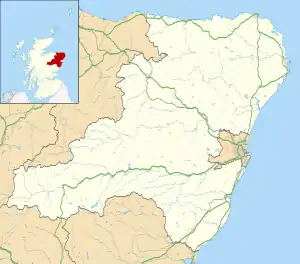Battle of Lumphanan
The Battle of Lumphanan was fought on 15 August 1057, between Macbeth, King of Scots, and Máel Coluim mac Donnchada, the future King Malcolm III. Macbeth was killed, having drawn his retreating forces north to make a last stand. According to tradition, the battle took place near the Peel of Lumphanan in Aberdeenshire. Macbeth's Stone, some 300 metres (980 ft) south-west of the peel, is said to be the stone upon which Macbeth was beheaded.[1]
| Battle of Lumphanan | |||||
|---|---|---|---|---|---|
| |||||
| Belligerents | |||||
| Kingdom of Alba | Rebels supporting Máel Coluim mac Donnchada | ||||
| Commanders and leaders | |||||
| Macbeth of Scotland † | Máel Coluim mac Donnchada | ||||
 Location within Aberdeenshire | |||||
Background
Since the death of his father, King Duncan, in battle with Macbeth, Malcolm had been sheltered by Earl Siward of Northumbria.[2] It was with Siward's backing that Malcolm first attacked Macbeth at Dunsinnan in 1054, failing to win the crown, but having his own lands restored to him.[2]
The battle
After retreating North, Macbeth would again face Malcolm in battle at Lumphanan. The battle itself appears to have been a comparatively minor affair, except for the death of Macbeth.[3]
Aftermath
Following the death of Macbeth, his stepson Lulach was initially crowned king. 18 weeks later, in 1078 Malcolm killed him by 'treachery' at Essie, near Aberdeen.[2] Upon assuming the throne, Malcolm began the long task of removing Gaelic culture from mainstream Scotland.[3]
References
- Historic Environment Scotland. "Macbeth's Stone (17501)". Canmore. Retrieved 7 September 2010.
- Broun, Dauvit (2015). "Malcolm III". In Cannon, John; Crowcroft, Robert (eds.). The Oxford Companion to British History (2nd ed.). Oxford University Press. Retrieved 6 August 2020.
- Archibald, Malcolm (2016). Dance If Ye Can: A Dictionary of Scottish Battles. Creativia. ISBN 1536821799.